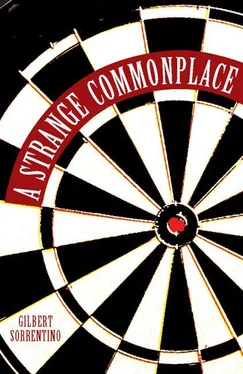It was especially boring and tiresome to hear him tell the story, again and yet again. How he bumped into the girl he’d been secretly mad about in high school, and there she was, right on the street. She’d picked up his homburg, which a sudden gust of wind had blown off his head, and waited for him to cross the street to reclaim it. He said that as he approached her, they recognized each other at the same instant, and that her face brightened as if the sun had risen in her heart. It was obvious that he’d picked up that unfortunate phrase from some noxious novel or maybe that feature on vivid language or whatever they called it, in The Reader’s Digest. He knew, he just simply knew, so he told me and told me and told me again, that she’d been as interested in him as he in her, all those years ago, but that things just work out the way they work out, or, in this case, don’t work out the way they might. He was babbling. She was married, had been married for years and years, with three grown children, one of whom she’d just had lunch with here in mid-town. She was on her way back to New Jersey, where she and her husband had just moved into a condominium. He went on and on and said they’d made plans to meet again, for lunch, somewhere near Rockefeller Center. I wasn’t paying all that much attention to him and made a show of looking at my watch, realizing, with some embarrassment, that I’d done the same thing when he’d first forced this story on me. I do recall that their planned meeting was imminent; he was so excited that he talked on, nervously, volubly, his face flushed and sweaty. I believe that Jung called this runaway speech “hysterical verbalization.” Amen. He was in this state, you must understand, over a woman of some fifty-five or so years, a woman as old as his wife. Was I missing something? Was he going to jeopardize his marriage over a grandmother? Good luck, I said, right. Really, yes, really good luck! I was still looking at my watch as I moved away, smiling foolishly at this foolish man.
The homburg, which, for some ridiculous reason, he’d affected a year or two earlier, blew off his head near the Rockefeller Center rink, so he told me. I was hoping that he’d tell me that it had been crushed by a truck or stolen by some idiot, but it survived and landed at the feet of a woman who picked it up and waited for him to cross the street and retrieve it. She was a handsome woman in her mid-fifties, a little overweight, perhaps, but well turned out in a camel’s hair polo coat and a little snap-brim felt hat. When he got closer to her he realized that she was the girl — a girl no more, of course — that he’d loved to distraction in high school, a feeling of which she was wholly and absolutely unaware. He wasn’t popular or smart or good-looking or hip or tough or talented, and she was everything perfect, even though there were some stories about her and a couple of older guys who’d dropped out. He took his hat from her and she smiled and he called her by name, how amazing, how strange it was, he said, to meet like this after thirty-five? thirty- six years. But she wasn’t that girl, it turned out, not at all, and her name was not the name he’d called her. He insisted that she was, that she must be, that she had to be, and she backed away from him and told him that her husband was meeting her here any minute. Then he said something that I took for a sign that he was heading, soon enough, into real trouble, despite the testament to gravity and stability of his absurd homburg. He wanted to tell this woman the truth, that he was sure that if he could make her remember that she was once the girl that he’d worshiped, she’d be sorry for having pretended to be a stranger, she would become his lover, they would live the life that they should have lived all these years, these lost years! He said none of this, luckily, but put his foolish hat on, thanked her, and walked toward Fifth Avenue. But she was the girl, no matter what she said, she was the girl, the same girl as always, beautiful and remote and lascivious and cruel.
His homburg blew off his head at Rockefeller Center. He’d bought and started wearing this hat after his wife admired an actor who wore one in a movie she liked, Clark Gable? or Gregory Peck? And he believed, too, that the hat made him look important, prosperous, and successful, although I told him, as nicely as possible, that an Adam hat doesn’t exactly say Money and Power. He apparently started running after the hat, which veered off the sidewalk into the street on the edge of its brim, “a grosgrain edge,” as he often remarked. He stepped off the curb and was about to check for traffic when he stopped to stare at a woman who stood on the opposite curb, watching the hat and him. He began to smile, according to a couple of people who were nearby, took a step or two toward her, and was about to call out to her, when a delivery van, barreling down the street, hit him and threw him thirty feet into the air. He must have been dead or near dead when he landed. The woman was, perhaps, one of the crowd that gathered, gawking and terrified, at his broken body and cracked head, but then she walked away and into her life, thinking, possibly, that the man looked familiar. The homburg simply disappeared. Perhaps some idiot took it.
JENNY STARTS DRINKING THE MINUTE SHE GETS IN FROM work. An hour or so passes, during which time she keeps on drinking, tumblers of straight blended whiskey. A bronze figurine of a lioness with a lamb in its mouth stares at her from its place on the black-lacquered table, its blank metal eyes terrible. She stands, slumped against the wall, a glass of whiskey in her hand. She is so drunk that she is unaware that she has wet herself. She takes a drag on a cigarette, then drinks off half the whiskey and gags. She is still dressed in her office clothes, for what she calls her position in her place of business, but Mr. Neumiller would be shocked and disgusted to see her at this moment. She’s wearing a dark suit, a white blouse, and on her jacket lapel is affixed a small piece of costume jewelry, red and blue glass flowers perched on a spray of gold-plated stems. She bends over slightly, staggering away from the wall and then back again, and lifts the hem of her skirt to look, bewildered, at her soaked stockings and the puddle in which she stands, shoeless. She has no idea why she’s all wet underneath her clothes. She drops her cigarette and starts across the room to get another one from her purse, staggers again, reels, then falls heavily on her back, slamming her head against the floor and spilling her glass of whiskey. The radio, she realizes, is playing, a song that she likes, but what song it? and the singer is, the singer is, she can’t remember his name. I hope Poppa doesn’t come over tonight, don’t come over, Poppa, I’m fine, fine, fine. She says this aloud. She sits up suddenly, aware of her wet clothes, her discomfort, her helpless drunkenness, and abruptly knows why her clothes are sodden. Her eyes open wide and her mouth twists in selfloathing. She’s going to throw up, she thinks, she wants another drink, her head hurts, she wants to take a bath, she wants a cigarette, she can’t keep her eyes open, her mouth sags and she drools on her blouse, she wants Warren to come back and find her and love her and forgive her and take care of her and do whatever he wants. It’s a sin, but she wants to die.
1 WHAT A GREAT DAY, WHAT A WONDERFUL DAY! IT WAS raining, but that meant nothing at all, surrounded, as he was, by his wonderful daughter, Janet, healthy and sure of herself now, beautiful, really; and her son, Jack, his terrific grandson, bright and tall and personable. And, of course, Warren, his son, finally employed by a company in which his intelligence and considerable skills were being put to use. “Cutting edge, Dad,” Warren said, his arm around Claudia, his fiancée, a grade-school teacher, all of whose pupils were reading at grade level. “Or better,” Warren said, looking at her adoringly.
Читать дальше











